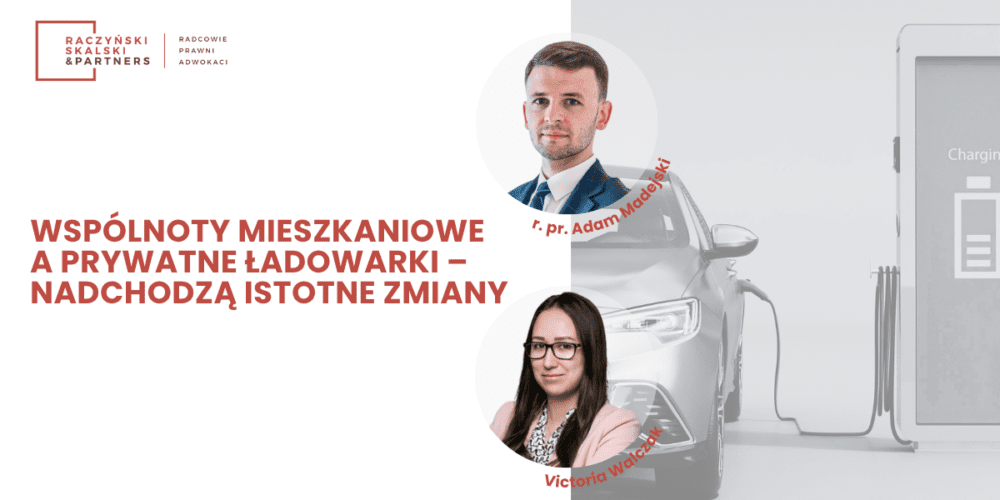New draft law on electromobility and alternative fuels – no more obstacles to installing private chargers in multi-unit buildings!
On 12 June 2025, a draft law amending the law on electromobility and alternative fuels (UDER53) was published on the website of the Government Legislation Centre.
The Ministry of Climate and Environment drew attention to the growing problem of refusals or lengthy processes for installing private charging points in multi-family residential buildings. In the justification for the draft, the climate ministry emphasises that the aim of the new regulations is to simplify the existing rules and procedures that currently hinder the development of electromobility in Poland.
How to start building your own charging point?
The possibility of installing a private charger for electric vehicles in multi-family residential buildings is provided for in the Act on Electromobility and Alternative Fuels. In any such building with more than three residential units, it is possible to install your own charging point. However, this requires prior approval from the community board, cooperative or property manager.
Below, we present a few steps describing what this process looks like from the applicant’s perspective.
Step 1: Submitting an application
An application may be submitted by a person who:
- has legal title to the premises (e.g. is the owner of the flat) and
- has a parking space for their exclusive use.
If the applicant plans to install a charger with a power rating of less than 11 kW and the building is managed by a housing community, the granting of consent will be treated as an ordinary management action. This means that it will not be necessary to hold a vote among the other owners of the premises.
What documents should be submitted with the application?
The applicant should submit the following to the management board of the community, cooperative or property manager (‘Manager’):
- Declaration of coverage of costs
a declaration in which the applicant undertakes to cover all costs related to the installation of the charging point.
- Declaration of legal title to the premises
a declaration of legal title to the premises (and if the applicant is not the owner of the premises, they should also submit the owner’s consent to the installation of the charging point)
- Consent of the provincial conservator of monuments
In a situation where the property is entered in the register of monuments.
Step 2: Expert opinion
Within 30 days of submitting a complete application, the Administrator is required to commission an expert opinion on the admissibility of installing a charging point. Once obtained, the expert opinion should be forwarded to the applicant without delay. It should be noted that an expert opinion is not required if the building already has a suitable installation that allows for the installation of a charging point.
Step 3: Review of the application
If an expert opinion is not required, the Administrator should review the application within 30 days of its submission. If an expert opinion is required, the application should be reviewed within 30 days of receiving it.
When can the Administrator refuse to grant permission for the installation of a charging point?
Refusal is only possible in four situations:
- The expert opinion shows that it is technically impossible to install a charging point;
- The applicant does not have legal title to the property;
- The applicant does not have the owner’s consent to install the equipment;
- The applicant has not undertaken to cover all installation costs (both for the equipment and the connection).
What does the preparation of an expert opinion look like? Documentation and costs
The entity preparing the expert opinion may require the applicant to provide the following documents:
- an electrical power distribution diagram;
- an electrical switchboard diagram;
- a parking lot plan with parking spaces and cable routes marked.
After the expert opinion has been prepared, a charging point installation design is developed, which must then be approved by the Administrator. The next stage is the installation of the electrical system, followed by the installation of the charger.
What does the expert opinion contain?
The expert opinion on the admissibility of the charging point installation should include, in particular:
- determination of the connection power of the building that can be used for the operation of the charging point;
- determination of the electrical installation points together with the parameters of the point to which the charger can be connected;
- the maximum power of the charger that can be connected to the electrical installation;
- construction and technical-installation solutions that need to be implemented to enable the installation of the charger;
- conditions necessary for the safe operation of the charger, including fire safety requirements.
It is important to note that for multi-unit buildings, it is necessary to conclude an additional energy sales agreement/comprehensive agreement.
After completion of the installation work, the Distribution System Operator (DSO) will be required to install an additional metering and billing system (meter) on the basis of which the energy consumption of the charging point will be billed.
How will the amendment change the entire charger installation procedure?
The draft amendment to the Act on Electromobility and Alternative Fuels UDER 53 contains the following proposals aimed at streamlining the procedure for obtaining consent for the installation of a charging point:
- Shortening the deadline for commissioning an expert opinion – the building manager will be required to commission an expert opinion within 14 days of receiving the request (currently 30 days);
- Possibility for the applicant to commission an expert opinion independently – after the expiry of the above-mentioned 14-day deadline, the applicant will have the possibility to commission an expert opinion independently;
- Obligation of the administrator to cooperate with the applicant – the administrator will be obliged to provide all necessary documentation and ensure access to the residential building in a manner enabling the applicant to carry out the expert opinion;
- Possibility to start installing a charging point – if there are no technical contraindications and provided that the applicant covers all the costs of the charging point themselves, they will be able to proceed with the installation and operation of the charger if the administrator does not recognise the application within 30 days of the expert opinion being submitted;
- Introduction of transitional provisions – applications submitted before the amendment comes into force will be considered under the new rules, which means that it will be possible to take advantage of more favourable provisions, including commissioning an expert opinion independently and proceeding with the installation and operation of the charging point.
More information about the draft law can be found at the following link:https://legislacja.rcl.gov.pl/projekt/12398900/katalog/13135497#13135497



